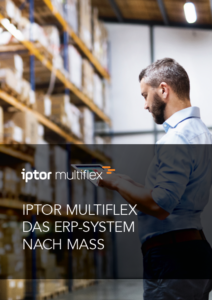The ERP is the central nervous system of a company. It bundles data from different business areas and enables efficient, centralized control of all work processes. The user interface should be adaptable so that each department can use the system according to its specific tasks.
In customer service, the ERP system is often used to process orders. The purchasing manager uses the system to plan orders with suppliers, and the business analyst segments data and creates clear sales reports. While many employees access the ERP system at their workstation, others need to be able to work with it on the move: A warehouse employee, for example, needs a barcode scanner for order picking, while a sales representative records calls and orders directly via the microphone on their cell phone during a customer appointment.
A powerful ERP system should meet all these requirements effortlessly and at the same time centralize the data from the various sources. As digitalization progresses, sooner or later every company will be faced with the decision to introduce a new ERP system. This raises the crucial question: should the software be cloud-based or hosted locally (on-premise)?
The differences between Cloud ERP and On-Premise ERP
The fundamental differences between a cloud ERP and an on-premise ERP lie in the way they are deployed, cost structure and responsibilities. A cloud ERP is hosted in an external data center and is accessible via the Internet from any location. This solution offers companies the opportunity to avoid expensive hardware investments, as the hosting provider provides and maintains the infrastructure. Updates and adjustments are usually carried out automatically and without interrupting ongoing operations.
An on-premise ERP, on the other hand, is installed in the company itself and requires its own servers and IT resources for maintenance and updates. This solution offers more control, but also higher initial costs and long-term obligations. These differences then have an impact on the cost structure: While cloud ERP systems are financed through monthly or annual subscription fees, the on-premise option represents a capital investment, supplemented by ongoing maintenance costs.
There are also significant differences in terms of security. Cloud ERP systems benefit from the hosting providers’ advanced protection measures, such as encrypted backups, AI-supported virus protection or 2-factor authentication. Companies that operate an on-premise ERP, on the other hand, are responsible for protecting their data themselves and must configure protection mechanisms themselves.
Worauf Sie achten sollten, wenn Sie sich zwischen einem Cloud-ERP und einem On-Premise-ERP entscheiden
Die Wahl zwischen einem Cloud-ERP und einem On-Premise-ERP ist eine wichtige Entscheidung, die sorgfältig überlegt sein sollte. Wir empfehlen Ihnen, mit den folgenden Fragen zu starten:
- Would you prefer a predictable monthly cost structure or high one-off investment costs with variable maintenance costs later on?
If a predictable cost structure is more important to you, a cloud-based ERP system might be the better choice. - Do you prefer to manage the security aspects yourself internally or would you like to use the security tools of a cloud provider?
A cloud ERP can simplify security management, while an on-premise ERP gives you full control but also responsibility. - Do you have the IT resources to operate and manage an on-premise ERP system?
Operating an on-premise ERP requires a skilled IT team, whereas with a cloud ERP, the provider takes over these tasks.
The advantages of the cloud ERP solution from Iptor multiflex
At Iptor multiflex, the focus is on offering companies a simple, secure and scalable solution. The cloud ERP system enables rapid implementation and flexible access – whether from the office, at home or on the move. Security features such as two-factor authentication and encrypted databases ensure that sensitive information is well protected. A full list of benefits can be found below:
- Worldwide access with no restrictions on the choice of end device (Android, MacBook, Ipad, etc.).
- No investment costs for hardware or server license.
- Simple, monthly upgrade of the ERP system
- Shorter project times and simple onboarding
- Reliable security mechanisms:
- AI-supported anti-virus software with detection and active reporting of potential attacks (24/7)
- 2-stage firewall system.
- 2-factor authentication
- Encrypted backup of the database in a Tier3 data center

Learn more about the security benefits of our cloud ERP solution.
Ultimately, the decision between a cloud ERP and an on-premise ERP depends on the company’s specific requirements and priorities. Cloud ERP offers flexibility and a predictable cost structure, while on-premise solutions can make sense for companies with their own strong IT infrastructure. Iptor multiflex supports you in this decision and offers customized solutions for your needs. Arrange a free consultation and let us work together to find the right solution for your warehouse management.
